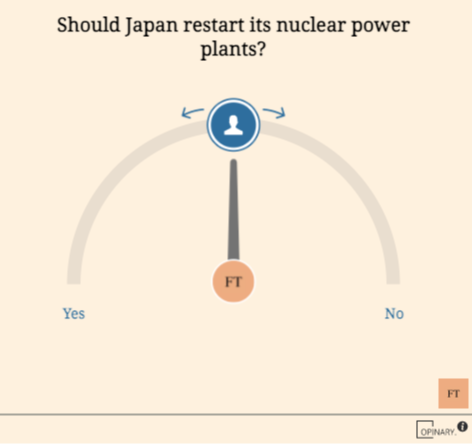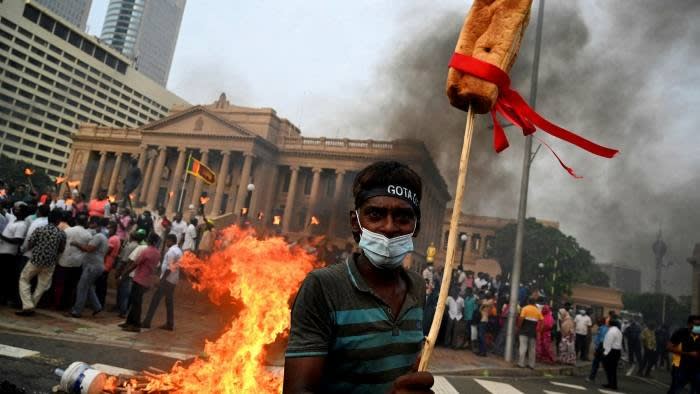[ad_1]
Good morning. This article is an on-site version of our FirstFT newsletter. Sign up to our Asia, Europe/Africa or Americas edition to get it sent straight to your inbox every weekday morning
How well did you keep up with the news this week? Take our quiz.
Companies have been forced to close factories in north-eastern Japan after a powerful earthquake struck off the coast, killing two people and reviving memories of the devastating 2011 tsunami that left 20,000 dead.
Transportation links to the region were severed and thousands of homes were without electricity following the 7.4-magnitude earthquake late on Wednesday evening.
Carmakers Toyota and Nissan and chipmaker Renesas suspended operations at their factories in the area, as residents swept shattered glass from the streets and authorities surveyed towns for damage.
“We will take all possible measures to respond to the disaster,” prime minister Fumio Kishida said, adding that Japan could be hit again by aftershocks in the coming days.
The quake hit Japan as the country debates whether to restart nuclear power plants. Kishida believes it is crucial to resume operations. Fresh concerns over nuclear safety will weaken his case and weigh down utilities stocks, writes Lex. Do you support nuclear power plants in Japan? Tell me what you think in our latest poll.
Thanks for reading FirstFT Asia. Send your feedback on this newsletter to firstft@ft.com. Now for the rest of today’s news — Emily
The war in Ukraine:
-
The latest: The US secretary of state has poured cold water on hopes of a diplomatic settlement to the war in Ukraine as he attacked Moscow for its increasingly gruesome assaults on civilian targets.
-
Debt: JPMorgan has processed interest payments sent by the Russian government for two of the country’s bonds, boosting investor expectations that Moscow will avoid defaulting on its debt for the first time since 1998.
-
Trade: India’s central bank is in initial consultations on a rupee-rouble trade arrangement with Moscow that would enable exports to Russia to continue after western sanctions restricted international payment mechanisms.
-
Economic impact: From price surges to panic buying, tough sanctions on Moscow have sparked fears of shortages and soaring costs. In Free Lunch, Martin Sandbu explains what we know about the economic impact of the war.
-
Russia-China ties: Listen to our Twitter Spaces discussing how China is positioning itself in the war, featuring FT’s Demetri Sevastopulo, Kathrin Hille and Marc Filippino.
-
Big Read: Ukraine — a divided country, deeply cynical about its government — has discovered a new sense of national identity while under fire.
Follow our live blog and updated maps for the latest on the conflict
Five more stories in the news
1. US and European stocks rise after central banks tighten policy US and European stocks rose on Thursday in choppy trading, following sharp rallies in the previous session, as traders weighed developments in Ukraine and central banks’ moves to tighten monetary policy.
2. Sri Lanka forced into IMF U-turn after protests The country has begun talks with the IMF over a debt relief package after protests over a deepening economic crisis forced Gotabaya Rajapaksa’s government into a policy U-turn. It previously insisted that Sri Lanka would be able to navigate the crisis without IMF assistance.
3. Amazon closes deal to acquire film studio MGM The $8.45bn acquisition, which includes debt, is Amazon’s largest in the media space and its biggest of any kind since the $13.7bn purchase of Whole Foods in 2017. Amazon closed its deal after US and European competition regulators declined to block the move, despite growing concern over the ecommerce giant’s size.
4. Spotify draws up plans to join NFT craze Spotify is drawing up plans to add blockchain technology and non-fungible tokens to its streaming service. Two recent job advertisements show Spotify is recruiting people to work on early-stage projects related to Web3.
5. Nazanin Zaghari-Ratcliffe released from Iran UK-Iranian dual national Nazanin Zaghari-Ratcliffe has arrived back in Britain after being detained by Tehran almost six years ago, in a move that could boost western diplomatic efforts to revive the 2015 nuclear accord.
Coronavirus digest
The days ahead
Biden-Xi call US president Joe Biden will hold a phone call with his Chinese counterpart Xi Jinping on Friday to discuss the war in Ukraine, among other issues.
Quadruple Witching Day Today is the day stock index futures, stock index options, stock options and single-stock futures expire, creating a flood of trading volume and arbitrage opportunities. (FT, Investopedia)
South Australian elections Voters go to the polls on Saturday for state parliamentary elections in South Australia, where a Labor victory appears likely. (The Conversation)
What else we’re reading
The fastest growing companies in Asia-Pacific The fourth annual ranking of high-growth companies in Asia-Pacific is our most competitive to date. An ecommerce business from the Philippines tops the list, while Japan is home to the most growth champions.
China Inc unconvinced Xi’s regulatory storm is over Vice premier Liu He’s pledge that Beijing would support the economy and financial markets had immediate effect in stemming a market rout on Wednesday. Yet analysts and insiders have warned that Liu’s comments might not mean the end of Beijing’s punishing regulatory overhaul and unpredictable policymaking.
Mukesh Ambani vs Jeff Bezos: The battle for India retail The long-running saga has pitted two of the world’s richest people against each other for the future of Indian retail. It highlights the difficulties for overseas ecommerce companies seeking to expand in a country that has 1.4bn consumers, but where regulations give local players an advantage.
Maths skills oil the wheels of financial literacy The biggest service we could do for future financial literacy is to embed mathematical skills for today’s pupils, writes Hilary Cooper. This article is the latest part of the FT’s Financial Literacy and Inclusion Campaign.
Wellness
At some point in the past couple of years, the practice of missing meals has grown so common as to be unremarkable. But when does it become dangerous? Jamie Waters explores the truth about fasting.
Thank you for reading and remember you can add FirstFT to myFT. You can also elect to receive a FirstFT push notification every morning on the app. Send your recommendations and feedback to firstft@ft.com
[ad_2]
Source link



